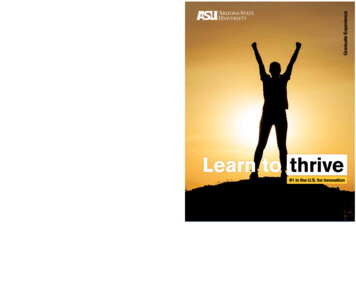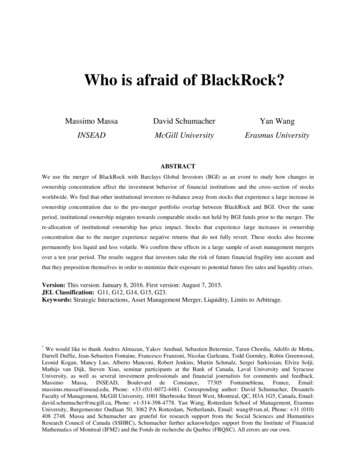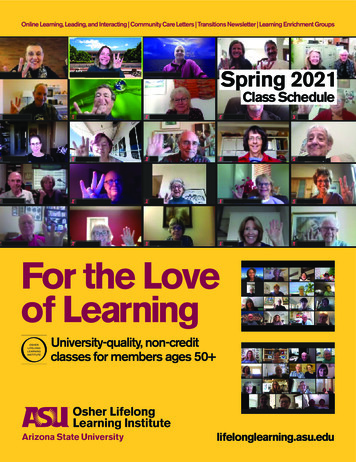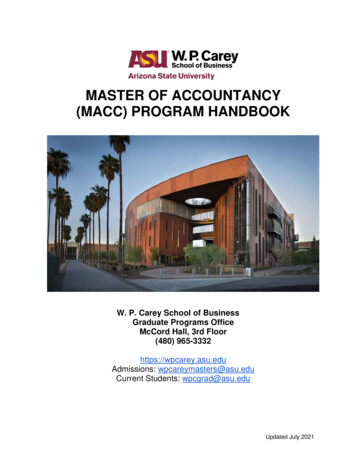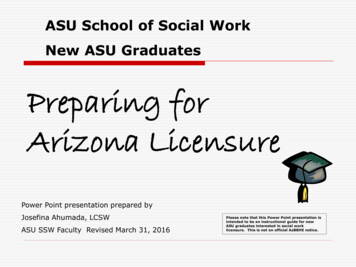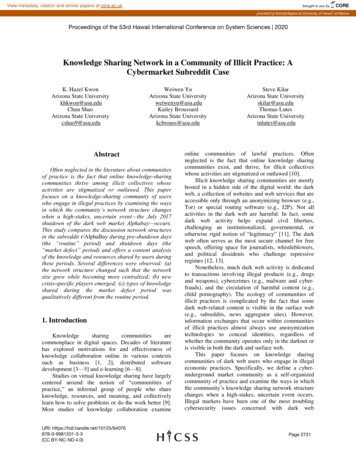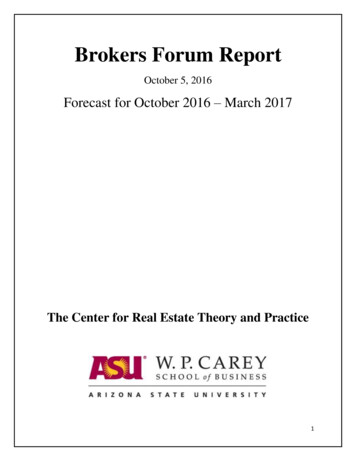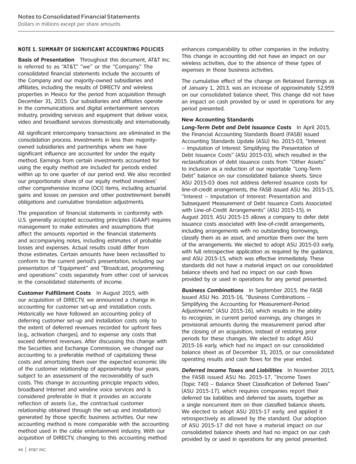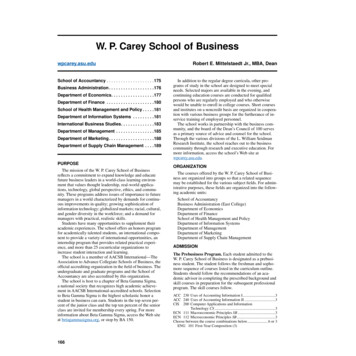
Transcription
W. P. CAREY SCHOOL OF BUSINESSW. P. Carey School of Businesswpcarey.asu.eduSchool of Accountancy . . . . . . . . . . . . . . . . . . . . 175Business Administration . . . . . . . . . . . . . . . . . . .176Department of Economics. . . . . . . . . . . . . . . . . .177Department of Finance . . . . . . . . . . . . . . . . . . . .180School of Health Management and Policy . . . . .181Department of Information Systems . . . . . . . . .181International Business Studies. . . . . . . . . . . . . .183Department of Management . . . . . . . . . . . . . . . .185Department of Marketing. . . . . . . . . . . . . . . . . . .188Department of Supply Chain Management . . . .189PURPOSEThe mission of the W. P. Carey School of Businessreflects a commitment to expand knowledge and educatefuture business leaders in a world-class learning environment that values thought leadership, real-world applications, technology, global perspective, ethics, and community. These programs address issues of importance to futuremanagers in a world characterized by demands for continuous improvements in quality; growing sophistication ofinformation technology; globalized markets; racial, cultural,and gender diversity in the workforce; and a demand formanagers with practical, realistic skills.Students have many opportunities to supplement theiracademic experiences. The school offers an honors programfor academically talented students, an international component to provide a variety of international opportunities, aninternship program that provides related practical experience, and more than 25 cocurricular organizations toincrease student interaction and learning.The school is a member of AACSB International—TheAssociation to Advance Collegiate Schools of Business, theofficial accrediting organization in the field of business. Theundergraduate and graduate programs and the School ofAccountancy are also accredited by this organization.The school is host to a chapter of Beta Gamma Sigma,a national society that recognizes high academic achievement in AACSB International-accredited schools. Selectionto Beta Gamma Sigma is the highest scholastic honor astudent in business can earn. Students in the top seven percent of the junior class and the top ten percent of the seniorclass are invited for membership every spring. For moreinformation about Beta Gamma Sigma, access the Web siteat betagammasigma.org, or stop by BA 150.166Robert E. Mittelstaedt Jr., MBA, DeanIn addition to the regular degree curricula, other programs of study in the school are designed to meet specialneeds. Selected majors are available in the evening, andcontinuing education courses are conducted for qualifiedpersons who are regularly employed and who otherwisewould be unable to enroll in college courses. Short coursesand institutes on a noncredit basis are organized in cooperation with various business groups for the furtherance of inservice training of employed personnel.The school works in partnership with the business community, and the board of the Dean’s Council of 100 servesas a primary source of advice and counsel for the school.Through the various divisions of the L. William SeidmanResearch Institute, the school reaches out to the businesscommunity through research and executive education. Formore information, access the school’s Web site atwpcarey.asu.edu.ORGANIZATIONThe courses offered by the W. P. Carey School of Business are organized into groups so that a related sequencemay be established for the various subject fields. For administrative purposes, these fields are organized into the following academic units:School of AccountancyBusiness Administration (East College)Department of EconomicsDepartment of FinanceSchool of Health Management and PolicyDepartment of Information SystemsDepartment of ManagementDepartment of MarketingDepartment of Supply Chain ManagementADMISSIONThe Prebusiness Program. Each student admitted to theW. P. Carey School of Business is designated as a prebusiness student. The student follows the freshman and sophomore sequence of courses listed in the curriculum outline.Students should follow the recommendations of an academic advisor in completing the prescribed background andskill courses in preparation for the subsequent professionalprogram. The skill courses follow.ACC 230 Uses of Accounting Information I.3ACC 240 Uses of Accounting Information II .3CIS 200 Computer Applications and InformationTechnology CS .3ECN 111 Macroeconomic Principles SB .3ECN 112 Microeconomic Principles SB .3Choose between the course combinations below. 6 or 3ENG 101 First-Year Composition (3)
W. P. CAREY SCHOOL OF BUSINESSENG 102 First-Year Composition (3)———or———ENG 105 Advanced First-Year Composition (3)———or———ENG 107 English for Foreign Students (3)ENG 108 English for Foreign Students (3)MAT 210 Brief Calculus MA.3MAT 211 Mathematics for Business Analysis .3QBA 221 Statistical Analysis CS .3Total . 27 or 30Accountancy and Computer Information Systems majorsshould refer to their specific requirements under the “Schoolof Accountancy,” page 175, and the “Department of Information Systems,” page 181, which list variations in the skillcourses.Completion of lower-division requirements does notensure acceptance to the upper-division professional program. Prebusiness students are not allowed to register for300- and 400-level business courses.The Professional Program. The junior and senior yearsconstitute the professional program of the undergraduatecurriculum. Admission to the professional program is competitive and limited by available resources. Admission isawarded to those applicants demonstrating the highestpromise for professional success.Students who wish to apply to the W. P. Carey School ofBusiness professional program must submit an applicationduring one of the three annual application periods. Candidates are strongly encouraged to visit Undergraduate Programs, in BA 109, at the beginning of the semester in whichthey wish to apply to pick up information regarding academic qualifications, admissions criteria, and applicationdeadlines. The application can be found on the Web atwpcarey.asu.edu/up/up professional program.cfm. Allapplicants must be admitted to ASU by the time they submittheir professional program application and must provideofficial SAT or ACT scores. Students are also required tocomplete the Business Basics online workshop beforeapplying to the professional program.Nonbusiness Students. A nonbusiness student is permittedto register for selected 300- and 400-level business coursesonly during online registration and only if, (1) at the time ofregistration, the student has junior standing (56 semesterhours completed) and (2) the student has a minimum cumulative GPA of 2.50 at ASU and a minimum GPA of 2.50 forall business courses completed at ASU. Students who have56 semester hours completed but have never attended ASUare given a one-semester period to register and to establish aGPA at ASU. Students must meet all prerequisites andcourse requirements as listed in the catalog. Economicscourses have different prerequisites; see the individual economics courses for those requirements (see page 178).Nonbusiness majors are limited to a maximum of 15semester hours of selected upper-division business courses(excluding ECN courses).Bachelor of Interdisciplinary Studies. The W. P. CareySchool of Business participates in the Bachelor of Interdisciplinary Studies (BIS) degree. For details about the BISdegree, refer to “School of Interdisciplinary Studies,”page 124.Minors. Two minors are available to nonbusiness students:a minor in Business and a minor in Small Business. TheSmall Business minor is offered only at the East campus. Tocomplete the Business minor, students must obtain therequirements from Undergraduate Programs in theW. P. Carey School of Business and complete the specifiedbusiness courses with a grade of “C” (2.00) or higher. Tocomplete the Small Business minor, students must obtainthe requirements from the East campus Business Administration program on SUTTON, third floor. Courses used in astudent’s major may not be used toward a minor. Studentsare advised to consult an advisor in the colleges of theirmajors to ensure the proper selection of courses for theminor. The upper-division courses for the minor arerestricted to students with 56 hours who are in good standing (a 2.00 ASU GPA or better).Nondegree Undergraduate and Graduate Students. Anondegree undergraduate or graduate student is permitted toenroll in selected 300- and 400-level business courses onlyduring online registration and only if (1) the student has anASU cumulative GPA of at least 2.50 and an ASU cumulative business GPA of at least 2.50 at the time of online registration or (2) the student has never attended ASU, in whichcase he or she is given a one-semester period to registerduring online registration and to establish a GPA at ASU.Students must meet all prerequisites and course requirements as listed in the catalog. Economics courses have different prerequisites; see the individual economics coursesfor those requirements (see page 178).Nondegree undergraduate and graduate students are limited to a maximum of 15 semester hours of selected upperdivision business courses (excluding ECN courses).SECONDARY EDUCATION—BAEThe College of Education offers a Bachelor of Arts inEducation degree in Secondary Education with an academicspecialization in business.Academic Specialization ITC AdmissionRequirementsThis degree is offered through the Initial Teacher Certification (ITC) program in the College of Education. See “Initial Teacher Certification Professional Program Admission,”page 194, for information on admission eligibility requirements, admission deadlines, field experiences, and studentteaching. For more information or to schedule an appointment with an advisor, call the Office of Student Services inthe College of Education at 480/965-5555.The following courses must be completed with a grade of“C” (2.00) or higher before applying to the ITC professionalprogram:ECN 111 Macroeconomics Principles SB.3ECN 112 Microeconomic Principles SB .3L literacy and critical inquiry / MA mathematics / CS computer/statistics/quantitative applications / HU humanities and fine arts / SB social andbehavioral sciences / SG natural science—general core courses / SQ naturalscience—quantitative / C cultural diversity in the United States / G global /H historical / See “General Studies,” page 92.167
W. P. CAREY SCHOOL OF BUSINESSIn addition, the following courses may be in progresswhen applying to the ITC but must be completed beforestarting the program:ACC 230 Uses of Accounting Information I.3CIS 200 Computer Applications and InformationTechnology CS .3Business. The major teaching field consists of 45 semesterhours and six additional hours in teaching methods. A minimum grade of “C” (2.00) is required in all academic specialization courses. Required major courses are as follows:ACC 230 Uses of Accounting Information I.3ACC 240 Uses of Accounting Information II .3CIS 200 Computer Applications and InformationTechnology CS .3ECN 111 Macroeconomic Principles SB .3ECN 112 Microeconomic Principles SB .3ENG 301 Writing for the Professions L .3FIN 300 Fundamentals of Finance .3or FIN 380 Personal Financial Management (3)LES 305 Legal, Ethical, and Regulatory Issues in Business.3MAT 211 Mathematics for Business Analysis .3MGT 300 Organizational Management and Leadership .3MGT 440 Small Business and Entrepreneurship.3MKT 300 Principles of Marketing.3MKT 310 Principles of Selling.3or MKT 424 Retail Management (3)QBA 221 Statistical Analysis CS .3SCM 300 Global Supply Operations.3Typing/keyboarding .1Total .46or COM 259 Communication in Business and theProfessions (3)ECN 112 Microeconomic Principles SB .3or ECN 111 Macroeconomic Principles SB (3)ENG 102 First-Year Composition.3or ENG 108 English for Foreign Students (3)MAT 211 Mathematics for Business Analysis .3Laboratory science SQ .4Total .16Second YearThird SemesterACC 230 Uses of Accounting Information I.3QBA 221 Statistical Analysis CS .3General Studies .3Laboratory science SQ/SG .4PGS or SOC course.3Total .16Fourth SemesterACC 240 Uses of Accounting Information II .3CIS 200 Computer Applications and InformationTechnology CS .3General Studies .9Total .15Prebusiness program total .62ADVISINGAccountancy and Computer Information Systems majorsshould refer to their specific course requirements under the“School of Accountancy,” page 175, and the “Department ofInformation Systems,” page 181, which list course requirement variations. Management majors should refer to theirspecific course requirements under the “Department ofManagement,” page 185.Students are encouraged to have College Algebra (MAT117) proficiency before registering in ECN 111 and 112.ECN 111 and 112 may be taken during the second and thirdsemesters without any delay in the prebusiness program.The student should follow the sequence of courses in the“Curriculum Outline Prebusiness Program,” on this page,and the recommendations of the academic advisor in completing the prescribed background and skill courses in preparation for the subsequent professional program.For more advising information, access the UndergraduatePrograms Web site at wpcarey.asu.edu/up.Professional Program. Students admitted to the professional program should select the necessary upper-divisionbusiness courses to complete the major by consulting theirdepartmental advising guide, with an academic advisor, orwith a faculty advisor. Professional program students mustcomplete COB 301, ENG 301, and SCM 300 during theirfirst semester in the professional program.Curriculum Outline Prebusiness ProgramTransfer Credit. Credit from other institutions is acceptedsubject to the following guidelines. Students planning totake their first two years of work at a community college oranother four-year college should take only those courses inbusiness and economics that are offered as freshman- orsophomore-level courses at any of the state-supported Arizona universities. These lower-division courses are numbered 100 through 299. A maximum of 30 hours of businessand economics courses from community colleges areaccepted toward a bachelor’s degree in business.Students may transfer a maximum of nine semester hoursof approved upper-division business course work requiredfor the business degree to the Tempe campus. Professionalbusiness courses taught in the junior or senior year in thestate universities may not be completed at a two-year college for transfer credit in the business core or major. TheTeaching MethodsBUE 480 Teaching Business Subjects .3BUE 481 Technology in Business and Vocational Education.3Total .6First YearFirst SemesterECN 111 Macroeconomic Principles SB .3or ECN 112 Microeconomic Principles SB (3)ENG 101 First-Year Composition.3or ENG 107 English for Foreign Students (3)MAT 210 Brief Calculus MA.3General Studies .3PGS or SOC course.3Total .15Second SemesterCOM 100 Introduction to Human Communication SB .3or COM 225 Public Speaking L (3)or COM 230 Small Group Communication SB (3)168
W. P. CAREY SCHOOL OF BUSINESSW. P. Carey School of Business Baccalaureate Degrees and MajorsMajorDegreeConcentrationAdministered ByAccountancyBusiness AdministrationComputer Information SystemsEconomics*FinanceManagementMarketingSupply Chain School of AccountancyEast CollegeDepartment of Information SystemsDepartment of EconomicsDepartment of FinanceDepartment of ManagementDepartment of MarketingDepartment of Supply Chain Management* This major is offered by the College of Liberal Arts and Sciences as well, with different requirementsintroductory course in the legal, ethical, and regulatoryissues in business is accepted as an exception to this policy,but only lower-division credit is granted. Such courses maybe utilized in the free elective category subject to the 30hour limitation. Courses taught as vocational or careerclasses at the community colleges that are not taught in theschools of business at any one of the state universities arenot accepted for credit toward a bachelor’s degree. Coursestaught in the upper-division business core at the state universities must be completed at the degree-granting institution unless transferred from an accredited four-year school.Normally, upper-division transfer credits are accepted onlyfrom AACSB International-accredited schools. To beaccepted for credit as part of the professional program inbusiness, all courses transferred from other institutions mustcarry prerequisites similar to those of the courses they arereplacing at ASU.An Associate in Transfer Partnership degree is availableto Maricopa community college students who wish to complete their first two years of course work at a Maricopa community college and transfer to the W. P. Carey School ofBusiness without loss of credit. An Associate of Businessdegree is available to students who wish to complete theirfirst two years of course work at an Arizona community college and transfer to the W. P. Carey School of Businesswithout loss of credit. Students should consult with an academic advisor in Undergraduate Programs to plan curriculum requirements and/or access Business Transfer Guidesfor optimal course selection at www.asu.edu/provost/articulation.DEGREESThe faculty in the W. P. Carey School of Business offerthe BS degree in Accountancy, Business Administration(East campus), Computer Information Systems, Economics,Finance, Management, Marketing, and Supply Chain Management upon successful completion of a four-year curriculum of 120 semester hours. Students may select one of themajors shown in the “W. P. Carey School of Business Baccalaureate Degrees and Majors” table, on this page. Eachmajor is administered by the academic unit indicated.GRADUATE PROGRAMSThe faculty in the W. P. Carey School of Business offergraduate degrees as shown in the “W. P. Carey School ofBusiness Graduate Degrees and Majors” table, page 170.Students have the opportunity to obtain dual degrees in twoyears with several master’s degree programs in theW. P. Carey School of Business, including these examples:MBA/MAISMBA/MHSMMBA/MS degree in Information ManagementMBA/MTaxOther concurrent degrees available are as follows:MBA/JDMBA/MArchMBA/MIM with Thunderbird, the Garvin School ofInternational Management, Glendale, AZ; GraduateSchool of Business Administration (Peru);Graduate School of Commerce (France); MonterreyInstitute for Technical and Superior Studies,Mexico State Campus (Mexico); and Carlos IIIUniversity of Madrid (Spain)Applicants to the MBA degree program must have significant work experience.For more information about the W. P. Carey MBA program, see the Graduate Catalog.COLLEGE OF EXTENDED EDUCATIONThe university-wide College of Extended Education provides an interactive link between ASU and the diverse communities it serves. The college assesses lifelong learningrequirements and works in partnership with campuses, othercolleges, and the community to serve learners, using a network of locations, programs, schedules, and technologies.For more information, see “College of Extended Education,” page 703, or access the Web site at www.asu.edu/xed.L literacy and critical inquiry / MA mathematics / CS computer/statistics/quantitative applications / HU humanities and fine arts / SB social andbehavioral sciences / SG natural science—general core courses / SQ naturalscience—quantitative / C cultural diversity in the United States / G global /H historical / See “General Studies,” page 92.169
W. P. CAREY SCHOOL OF BUSINESSW. P. Carey School of Business Graduate Degrees and MajorsMajorDegreeConcentration1Administered ByAccountancy and InformationSystemsBusiness AdministrationMAIS—School of AccountancyMBAPhD—W. P. Carey School of BusinessAccountancy, computer information systems, W. P. Carey School of Businessfinance, health services research,2management, marketing, or supply chainmanagement—Department of Economics—School of Health Managementand Policy—Department of InformationSystemsCommunity health practice or healthSchool of Health Managementadministration and policyand Policy—Committee on Statistics—School of AccountancyEconomicsHealth Sector ManagementMS, PhDMHSMInformation ManagementMSPublic Health2MPHStatistics3TaxationMSMTax1If a major offers concentrations, one must be selected unless noted as optional.Applications are not being accepted at this time.3 This program is administered by the Division of Graduate Studies.2UNIVERSITY GRADUATION REQUIREMENTSIn addition to fulfilling school and major requirements,students must meet all university graduation requirements.For more information, see “University Graduation Requirements,” page 88.Social and Behavioral Sciences. W. P. Carey School ofBusiness students must complete ECN 111 and 112, onecourse with the PGS prefix, and one course with the SOCprefix and may include these courses toward the GeneralStudies requirements.General Studies RequirementAll students enrolled in a baccalaureate degree programmust satisfy a university requirement for a minimum of 35hours of approved course work in General Studies, asdescribed under “General Studies,” page 92. Note that allthree General Studies awareness areas are required.General Studies courses are listed in the “General StudiesCourses” table, page 94, in the course descriptions, in theSchedule of Classes, and in the Summer Sessions Bulletin.Mathematical Studies. W. P. Carey School of Businessstudents must complete MAT 119 and MAT 211 (or a moreadvanced MAT course) and QBA 221 and may includethese courses toward the General Studies requirements.First-Year Composition RequirementCompletion of both ENG 101 and 102 or ENG 105 with agrade of “C” (2.00) or higher is required for graduationfrom ASU in any baccalaureate program.Additional Courses. Additional courses, as needed to complete 60 hours (54 hours for Accountancy majors), may beselected from the General Studies areas (see “General Studies,” page 92) or from the W. P. Carey School of BusinessPolicy Statement. Students are encouraged to consult withan academic advisor to ensure that they comply with allnecessary requirements. Business courses may not be usedto fulfill this requirement except for ECN 111 and 112 andQBA 221.SCHOOL DEGREE REQUIREMENTSSchool degree requirements supplement the GeneralStudies requirement with additional course work from theapproved university general studies list or the W. P. CareySchool of Business Policy Statement. Business courses maynot be used to fulfill school degree requirements except forECN 111 and 112 and QBA 221.A well-planned program of study may enable students tocomplete many General Studies and school degree requirements concurrently. Students are encouraged to consult withan academic advisor in planning a program to ensure thatthey comply with all necessary requirements.Specific courses from the following areas must be takento fulfill the school degree requirements.170Communication. All students in the W. P. Carey School ofBusiness except Accountancy and Management majorsmust complete COM 100, 225, 230, or 259 and ENG 301.Accountancy majors must complete COM 230 (or 100) and259. Management majors must complete COM 225 or 259.Additional Graduation RequirementsIn addition to completion of courses outlined under“Major Requirements,” page 171, to be eligible for the BSdegree in the W. P. Carey School of Business, a studentmust1. have completed at least 30 semester hours at theTempe campus;
W. P. CAREY SCHOOL OF BUSINESS2. have attained a cumulative GPA of 2.00 or higher forall courses taken at this university, for all businesscourses taken at this university, and for all coursesfor the major taken at this university;3. have earned a “C” (2.00) or higher in each lowerdivision core and skill course and each course in themajor;4. have earned a minimum of 51 semester hours in traditional courses that were designed primarily forjunior or senior students and were completed in anaccredited, four-year institution; and5. have met all university degree requirements.Exceptions. Any exception to these requirements must beapproved by the Standards Committee of the W. P. CareySchool of Business.Declaration of Graduation. A student in a professionalprogram must complete a Declaration of Graduation duringthe semester in which the student completes 87 semesterhours. The Degree Audit Reporting System should be usedto guide the student in successfully completing degreerequirements in a timely manner. Students who have notmet this requirement are prevented from further registration.Some students may be required to complete a Program ofStudy in place of the Declaration of Graduation. Studentsshould consult their advisors for the proper procedure.Pass/FailBusiness majors may not include among the creditsrequired for graduation any courses taken at this universityon a pass/fail basis. Pass/fail credits taken at another institution may be petitioned for use, but only if the student candemonstrate proof that the pass grade was equivalent to a“C” (2.00) or higher.MAJOR REQUIREMENTSStudents seeking a BS degree in the W. P. Carey Schoolof Business must satisfactorily complete a curriculum of120 semester hours.A major consists of a pattern of 18 to 24 semester hoursin related courses falling primarily within a given subjectfield. Available majors are shown in the “W. P. Carey Schoolof Business Baccalaureate Degrees and Majors” table,page 169.Major Proficiency Requirements. Students must receivegrades of “C” (2.00) or higher in upper-division courses forthe major. If a student receives a grade below “C” (2.00) inany course in the major, this course must be repeated. If asecond grade below “C” (2.00) is received in either anupper-division course in the major already taken or in a different upper-division course in the major, the student is nolonger eligible to take additional upper-division courses inthat major. University policy states a course may berepeated only one time.Business Core RequirementsThe business core is designed to provide an understanding of the fundamentals of business and to develop a broadbusiness background. The faculty designed the core to coverthe impact of information technology and e-business prac-tices on business. By educating and training students in theuse of data-driven decision-making tools and applicationssoftware, the school provides greater opportunity for its students. All students seeking a BS degree in the W. P. CareySchool of Business complete the core courses.The lower-division business core courses provide the fundamental skills needed in professional program courses andintroduce students to the supply chain, business processes,and enterprise solutions software in addition to technologyskills such as Excel and Access.Lower-Division Business CoreACC 230 Uses of Accounting Information I.3ACC 240 Uses of Accounting Information II .3CIS 200 Computer Applications and Infor
academic experiences. The school offers an honors program for academically talented students, an international compo-nent to provide a variety of international opportunities, an internship program that provides related practical experi-ence, and more than 25 cocurricular organizations to increase student interaction and learning.
